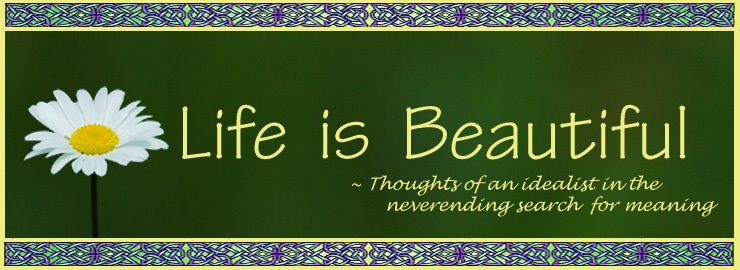
Currently, I'm reading A New Earth by Eckhart Tolle. I've always been curious about books that people claim have changed their lives. And, as you may remember, Oprah was a huge follower of Tolle several years ago. So I decided to see what it was all about.
I am generally a bit skeptical of anything overly spiritual. Although I consider myself spiritual in a sense, I am atheist. And, having studied the hard sciences (biology major) and anthropology in college, I prefer to find physical or rational explanations. That said, I do believe that individuals can affect the quality of their experience in life through thought. And I am always open to hearing how another human has made sense of life, how their thoughts shape their experience. I recognize how my range of thoughts are limited by my individual experience, and I like learning new ways of thinking that I would never have conceived of on my own.
So in this spirit, I started reading A New Earth. And what I found was something fascinating...about me.
First, for those of you who haven't read Tolle, I'll do my best to summarize his ideas as I understand them thus far (I haven't finished the book yet).
Tolle says that a person is comprised of an illusory self which he calls the "ego", and the true self, or "consciousness," which is the presence within you who is hearing the thoughts of the ego. The ego is the speaker who we often think of as "I". But, he asserts that "I" is an illusion because it is given definition through human constructs (such as words). He says, "the greatest miracle is the experiencing of your essential self as prior to any words, thoughts, mental labels, and images. For this to happen you need to disentangle your sense of I, of Beingness, from all the things it has become mixed up with, that is to say, identified with." (A New Earth, page 26.)
This makes sense to me. I have been aware that there is a part of me who can hear myself thinking, that there is indeed a presence separate from and beyond the thoughts in my mind. A presence that doesn't think, it is just aware, it just "is." So, this is my true self listening to my ego. I just didn't define the two so clearly as the "ego" and my "consciousness."
What has amazed me while reading is my realization that I was fully aware of my true self from a very young age.
I remember doing a worksheet in 3rd grade (I was 8) about self identity. We had to answer questions like "my favorite food is...," "my favorite color is...," and "I'm really good at...." It is my first memory of defining my self, comparing myself to others and seeing how I am different. It was my first organized effort to figure out who I am. And I remember having a strong sense of "knowing" things that I couldn't put into words. Clearly, my intuiting function was already well developed. For example, I knew which group of friends the new girl would join upon my first interaction with her. I knew how to change my behavior to fit in with different "types". I had clear visions of how everyone in my world was connected-- I saw the structure of the interrelationships. Some of this was the development of Tolle's ego-- defining myself and the world with words and labels. But I also "knew" that my true self wasn't definable, it just was. And a few years later, that awareness became very strong.
 When I was about 14 or 15, I used to wander off into the woods. I had a favorite boulder where I would sit and think. Sometimes I brought a journal. Sometimes I was working through a particular issue in my life (the usual teen situations). And sometimes I just sat to "commune with life" (as I called it then). The forest was filled with white birch trees which I loved, and I would sit and feel like I was one with them. Though my rational mind thought I was a bit bonkers at the time, I was aware of a joy that is beyond description. It was the start of my Life is Beautiful motto. I chose not to analyze it, because it was a source of strength that I knew, even then, was uncommon.
When I was about 14 or 15, I used to wander off into the woods. I had a favorite boulder where I would sit and think. Sometimes I brought a journal. Sometimes I was working through a particular issue in my life (the usual teen situations). And sometimes I just sat to "commune with life" (as I called it then). The forest was filled with white birch trees which I loved, and I would sit and feel like I was one with them. Though my rational mind thought I was a bit bonkers at the time, I was aware of a joy that is beyond description. It was the start of my Life is Beautiful motto. I chose not to analyze it, because it was a source of strength that I knew, even then, was uncommon. So when I read something in Tolle's book, tears came to my eyes. I felt a sense of validation that I've never felt before. He talks about the "influx of joy" and "inner peace" that fills you when you first experience the separation of the ego self (your thoughts and the content of your mind) from the simple awareness of being. Thoughts are constructs that limit our perceptions. Awareness is not limiting. It just is. This experience "happens in such a subtle way that [people] hardly notice it." (A New Earth, page 30.) This same subtle joy and peace is what came upon me in that forest. The joy of Being can only be felt "when you get out of your head. Being must be felt. It can't be thought." (A New Earth, page 40.)
How is this a strength? I have been told by several people through the years that I have a strength which they admire. In high school, my friends found my optimism curious. They joked about it, but I knew they also wished for the peace that I often felt. In college, my best friend told me I had an amazing "spiritual strength", which I chuckled at because I was on the verge of leaving my faith and embracing atheism. I hadn't considered my way of thinking a strength. To me, it was just the way life is. Just truth, as I saw it. Rational and realistic, not spiritual or some extraordinary ability to see through rosy glasses. And I didn't see myself as "stronger" than anyone else (I still don't.) I've got plenty of weaknesses. So what exactly is my "strength"?
Again, my heart stopped as I read Tolle's discussion on happiness. He says, "the primary cause of unhappiness is never the situation but your thoughts about it. Be aware of the thoughts you are thinking. Separate them from the situation, which is always neutral, which always is as it is." (A new Earth, page 96.) And furthermore, he says, "Don't seek happiness. If you seek it, you won't find it, because seeking is the antithesis of happiness. Happiness is ever elusive, but freedom from unhappiness is attainable now, by facing what is rather than making up stories about it. Unhappiness covers up your natural state of well-being and inner peace, the source of true happiness." (A New Earth, page 96.)
Yes! He has put into words something that I've "known" for all these years, but was unable to explain to others. We all have this ability to become aware of our true essence, by becoming aware of the presence behind our thoughts and emotions. And when we are aware of it, we can't help but sense a deep peace and happiness. Because happiness is our natural state of being, what "is" when we strip away all the thoughts and constructs that we have accumulated through thinking (the ego's function). This was the source of my "strength." I knew how to be free from unhappiness.
There was another reason tears came to my eyes while reading. I realized that at some time through the years I have woefully forgotten to separate my self from my ego. I have fallen into the ego's trap. I have been allowing my thoughts and emotions to define what is, instead of just "being". And as a result, I have caused pain, for myself and others.
So thank you, Eckhart Tolle, for skillfully using words to express what I could not. And for reminding me of who I am.





